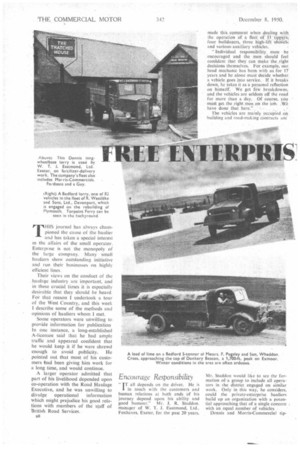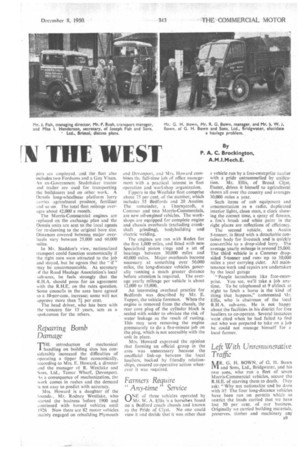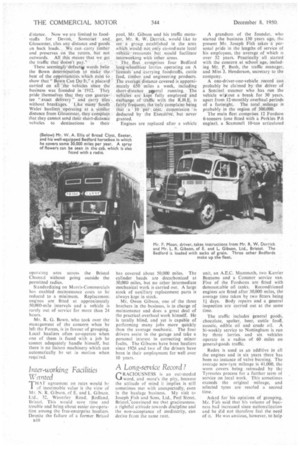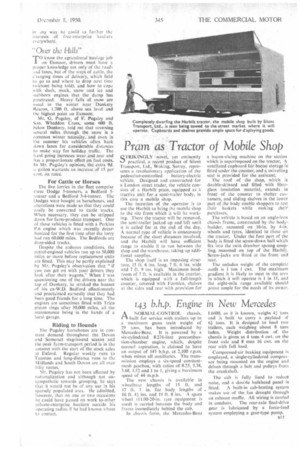1FR E1E UNTIFIRPRIS Tilt 111/ST
Page 42

Page 43

Page 44

Page 45

If you've noticed an error in this article please click here to report it so we can fix it.
By P. A. C. Brockington, A.M .I.M ech. E.
THIS journal has always championed the cause of the haulier and has taken a special interest in the affairs of the small operator. Enterpi ise is not the monopoly of the large Company. Many small hauliers show outstanding initiative and run their businesses on highly efficient lines.
Their views on the conduct of the haulage industry are important, and in these crucial times it is especially desirable that they should be heard. For that reason I undertook a tour of the West Country, and this week 1 describe some of the methods and opinions of hauliers whom I met.
Some operators were unwilling to provide information for publication In one instance, a long-established A-licensee said that he had ample traffic and appeared confident that he would keep it if he were shrewd enough to avoid publicity. He pointed out that most of his customers bad been giving him work for a long time, and would continue.
A larger operator admitted that part of his livelihood depended upon co-operation with the Road Haulage Executive, and he was unwilling to divulge operational information which might prejudice his good relations with members of the staff of British Road Services.
B8
Encourage Responsibility
"IT all depends on the driver. He is 1 in touch with the customers and human relations at both ends of his journey depend upon his ability and good humour." Mr, J. R. Staddon. manager of W. T. J. Eastmond, Ltd.. Foxhaves. Exeter, for the past 20 years. made this comment when •dealing with, the operation of a fleet of 11 tippers.; four bulldozers, three high-lift shovels and various auxiliary vehicles.
" Individual responsibility must be encouraged and the men should feel confident that they can make the right decisions themselves. For example, our head mechanic has been with us for 17 years and he alone must decide whether a vehicle goes into service. If it breaks down, he takes it as a personal reflection on himself. We get few breakdowns, and the vehicles are seldom off the road for more than a day. Of course, you must get the right men on the job; We
have done that here." : • . • The vehicles are mainly occupied .on building and road-making contracts ant
Mr. Staddon would like to see the formation of-a group to include all operators in the district engaged on similar work. Only in this way, he considers, could the private-enterprise hauliers build up an organization with a potential approaching that of a single concern with an equal number of vehicles
Dennis and Morris-Commereial tip
pers tire employed. and the Aleet also includes two Fordsons and a Guy Vixen. All ex-Government Studebaker tractor .snd trailer are used for transporting the bulldozers and on other work. A Dennis long-wheelbase platform lorry carries agricultural produce, fertilizer and so on. the total fleet mileage averages about 42,000 a month.
The Morris-Commercial engines are replaced on the exchange plan and the Dennis units are sent to the local agents for re-sleeving to the original bore size. Distances covered between major overhauls vary between 25,000 and 60,000 iii les_
In Mi. Staddon's view, nationalized transport could function economically if the right men were attracted to the job and stayed, but he agrees that the " if" may be unsurmountabIe. As secretary of the Road Haulage Association's local sub-area, he feels strongly that the R.H.A. should press for an agreement with the R.H.E. on the rates question. Some councils in the area have agreed to a 10-per-cent, increase; some will not approve more than 71 per cent.
The head driver, who has been with the 'concern for 13 years, acts as a spokesman for the others.
Repairing Bomb Damage
ThlE introduction of mechanical andling on building sites has considerably increased the difficulties of operating a tipper fleet economically, according to Mrs. E. Howard, a director .ind the manager of R. Westlake and Sons, Ltd., Tamar Wharf, Devonport. As a consequence of mechanization, the work comes in rushes and the demand is not easy to predict with accuracy.
Mrs. Howard is a daughter of the founde., Mr. Rodney Westlake, who started the business before 1900 and continued with horsed vehicles until 1926 Now there are 82 motor vehicles mainly engaged on rebuilding Plymouth and Devonport, and ‘Irs. Howard combines the fult-time job of office management with a practical interest in fleet operation and workshop organization.
Tippers in the Westlake fleet comprise about 75 per cent, of the number, which includes 55 Bedford s and 20 Austins. The remainder, a Thornycroft, a Commer and two Morris-Commercials, are new oil-engined vehicles. The workshops are equipped for complete engine and chassis overhauls (excluding crankshaft grinding), bodybuilding and electric welding.
The engines are run with Redex for the first 1,000 miles, and fitted with new Specialloid piston rings and a set of bearings between 30,000 miles and 40,000 miles. Major overhauls become necessary at something over 50,000 miles, the long-distance vehicles generally running a much greater distance before attention is required. The average yearly mileage per vehicle is about 12,000 to 15,000., An interesting overhaul practice for Bcdfords was described by Mr. E. Tupper, the vehicle foreman. When the engine is removed from the chassis, the rear core. plug of the cylinder block is sealed with solder to obviate the risk of water leakage as the result of rusting. This may save removing the engine prematurely to do a five-minute job on the plug, which is not accessible with the unit in place.
Mrs. Howard expressed the opinion that forming an official group in the area was unnecessary because the unofficial link-up between the local hauliers, backed by friendly relationships, ensured co-operative action whenever it was required.
Farmers Require
" Any-time " Service ONE of three vehicles operated by Mr. W. A. Ellis is a horsebox based on a Bedford coach chassis and known as the Pride of Clyst. No one could view it and decide that it was other than a vehicle run by a free-enterprize Dauber with a. pride untrammelled by unification. Mr. Ellis, of Broad Clyst. Exeter, drives it himself to agricultural shows all over the country and averages 30.000 miles a year.
Such items of cab equipment and ornamentation as a radio, duplicated interior lights, clean mats, a clock showing the correct time, a spray of flowers, a fox's brush and white paint in the right places are reflections of efficiency.
The second vehicle. an Austin 5-tonner, is fitted with a detachable container body for livestock and is quickly convertible to a drop-sided lorry. The average yearly mileage is around 25.000. The third vehicle is a Commer dropsided 5-tonner and runr; up to 50,000 miles a year carrying cider. All maintenance work and repairs are undertaken by the local garage
"People hereabouts like free-enterprise. You see, we'll take a job anytime. To be telephoned at 9 o'clock at night to fetch a horse is the kind of thing that happens," commented Mr. Ellis, who is chairman of the local R.H.A. sub-area. He is not happy about the facilities in his district for free hauliers to co-operate. Several instances were cited when he had failed to find out who was prepared to take on a job he could not manage himself for a local farmer.
Left With Unremunerative Traffic
NAR. G. H. BOWN, of G. H. flown IVA and Sons, Ltd., Bridgwater, and his two sons, who run a fleet of seven Morris-Commercial vehicles, accuse the R.H.E. of starving them to death. fhey ask: "Why not nationalize and be done with it? The four long-distance vehicles have been run on permits which so restrict the loads carried that we have lost 50 per cent, of our business. Originally we carried building materials, preserves, timber and machinery any distance. Now we are limited to foodstuffs for Devon, Somerset and Gloucester, tiles any distance and goods on back loads.. We can .-carry -timber and preserves on the return, but not outwards. All this means that we get
the traffic that doesn't pay." These seemingly:defeati* words belie the Bown determination td Make the best of the opportunities which exist to
show that " BoWn Can a plaCatdcarried on all the Vehicles since the business was founded in -1912. May pride themselves that they can -guaran-: tee "exact delivery" and carry tiles without breakages. Like many South Wales haulierS Operating at a similar distance from Gloucester, they complain that they cannot send their short-distance vehicles to destinations in their
operating area across the Bristol Charmel without going outside the permitted radius.
S:andardizing on Morris-Commercials has enabled maintenance costs to be. reduced to a minimum. Replacement engines are fitted at approximately 50.000-mile intervals and a vehicle is rarely out of service for more than 24 hours.
Mr. R. G. Bowit, who took over the management of the concern when he left the Forces, is in favour of grouping. Local hauliers often co-operate when one of them is faced with a jab he cannot adequately handle himself, but there is no liaison machinery which can automatically be set in motion when required.
Inter-working Facilities Wanted
THAT agreement on rates would be of inestimable value is the view of Mr. N. 1Z. Gibson, of E. and L. Gibson. Ltd., 32, Waverley Road, Redland. Bristol. This would save time and trouble and bring about easier co-operation among the free-enterprise hauliers. Despite the failure of a former Bristol pool, Mr. Gibson and his traffic manager, Mr. R. W. Derrick, would like to see a group established in the area which ...Would. not only co-ordinate local vehicle` resources but _Would facilitate interworktng with Other areas.
Thefleet . comprises four Bedford long-wteelh-ase lorries operating on A licences and carrying foodstuffs, cattle feed, timber and engineering products. The average distance covered is appeoximately 650 miles a week, including short-distance gipperal running. The vehicles arc kept fully employed and exchange of traffic with the is fairly frequent; the Only Complaint being that la r:10 per cent. commission is deducted by the Executive,hut never granted.
Engines are replaced after a vehicle has covered about 50,000 miles. The cylinder heads are decarbonized at 30,000 miles, but no other intermediate mechanical work is carried out. A large stock of auxiliary replacement parts is always kept in stock.
Mr. Owen Gibson, one of the three brothers in the business, is in charge of maintenance and does a great deal of the practical overhaul work himself, He is totally blind, and yet is capable of performing many jobs more quickly than the average mechanic. The four drivers assist in the garage and take a personal interest in correcting minor faults. The Gibsons have been hauliers since 1926 and two of the drivers have been in their employment for well over 10 years.
A Long-service Record?
GRACTOUSNESS is an out-moded word, and more's the pity, because the attitude of mind it implies is still sometimes met with unexpectedly, even in the haulage business. My visit to Joseph Fish and Sons, Ltd., Peel Street, Bristol.'convinced me that graciousness. a rightful attitude towards discipline and the non-acceptance of mediocrity, can derive from the same root.
A grandson of the founder, who started the business 130 years ago, the present Mr. Joseph Fish takes a personal pride in the lengths of service of his employees, the average of which is over 32 years. Practically all started with the concern at school age, including Mr. P. Bush, the traffic manager, and Miss 1 Henderson, secretary to the company.
A one-driver-one-vehicle record can probably be claimed by the driver of a Sentinel steamer who has run the vehicle wi:kout a break for 30 years, apart from 12-monthly overhaul periods of a fortnight. The total mileage is probably in the region of 360,000.
The main fleet comprises 12 Fordson 6-tonners (one fitted with a Perkins P.6 engine), a Scammell 10-ton articulated
unit, an A.E.C. Mammoth, two Karrier Bantams and a Commer service van. Five of the Fordsons are fitted with del-noun:able oil tanks. Reconditioned engines are fitted after 30,000 miles, the average time taken by two filters being 11 days. Body repairs and a general inspection are carried out at the same time.
The traffic includes general goods, chocolate, speller, beer, cattle food, caustic, edible oil and crude oil. A bi-weekly service to Nottingham is run by three lorries and six vehicles operate in a radius of 60 miles on general-goods traffic.
Redex is used as an additive in all the engines and in six years there has been no instance of valve burning. The average new-tyre mileage is 41,000, the worn covers being retreaded by the Tyresoles process for a further term of service on local work. This sometimes exceeds the original mileage, and selected tyres are resoled a second time.
Asked for his opinions of grouping, Mr. Fish said that his volume of business had increased since nationalization and he did not therefore feel the need of it. He was anxious, however, to help in any way he could to further the interests of free-enterprise hauliers everywhere.
"Over thc Hills" ..
TO know the agricultural haulage job On Exmoor, drivers must have proper knowledge not only of the reads ;ind lanes, but of the svays.of cattle, the ebanging times of delivery, which field to go to and where to drop next time twitheiut being told), and how to cope with slush, muck, snow and ice and stubborn engines that the damp has penetrated. Heavy falls of snow are usual in the winter near Dunkery Beacon, 1.700 ft. above sea level and he highest point on Exmoor.
Mr. G. Pugsley, of F. Pugsley and San, Wheddon Cross, some 600 ft. below Dunkery, told me that reversing several miles through the snow is a common winter necessity, and even: in the summer his vehicles often back down lanes for considerable clistanees to make way for holiday traffic. The hard gciing increases wear and tear and Isas a proportionate effect On fuel costs, in Mr. Pugsley's opinion, the extra 9d, galEen.warrants an increase of 15 percent. on rates.
For Cattle or Horses The five lorries in the fleet comprise three Dodge. 5-tormera, a Redford 5tanner and a Bedford 3-4-tormer. The Dodges Were bought as horseboxes, and ilteratioria were made so that they could easily be converted to cattle trucks. When necessary. they can be stripped down for farm-produce transport. One of these vehicles is fitted with a Perkins P.6 engine which was recently decarbonind for the first time after the lorry had run 60,000 miles. The Bedfords are drop-sided track s.
Despite the arduous conditions, the petrol-engined vehicles rue up•to 50,000 miles or more. before replacement units are fitted. This may be partly explained by Mr..Pugsley's observation that "if sou can get on with your drivers they look after their wagons." Whenle was questioning one of the drivers near the top of Dunkery, he stroked the bonnet of his ex-W.D. Bedford affectionately and proclaimed earnestly that they had heen good friends for a long time. The engines are sometimes fitted with Trieo piston rings after 30,000 miles, all the maintenance being in the hands of a local garage.
Riding to Hounds
The Pugsley horseboxes are in constant demand throughout the Deveti and Somerset stag-hound season and the peak farm-transport period is in the autumn with the start of the stock sales at Exford. Regular weekly runs to Taunton and long-distance runs to the Midlands and South Devon are all over hilly routes.
Mr. Pugsley has not been affected by nationalization and although not unsympathetic towards grouping, he says that it would not be of any use in his sparsely populated area. 14e admitted, however, that on one or two occasions he could have passed on work to-other private-enterprise hauliers outside his operating radius if he had 'known whom to contact.




























































































